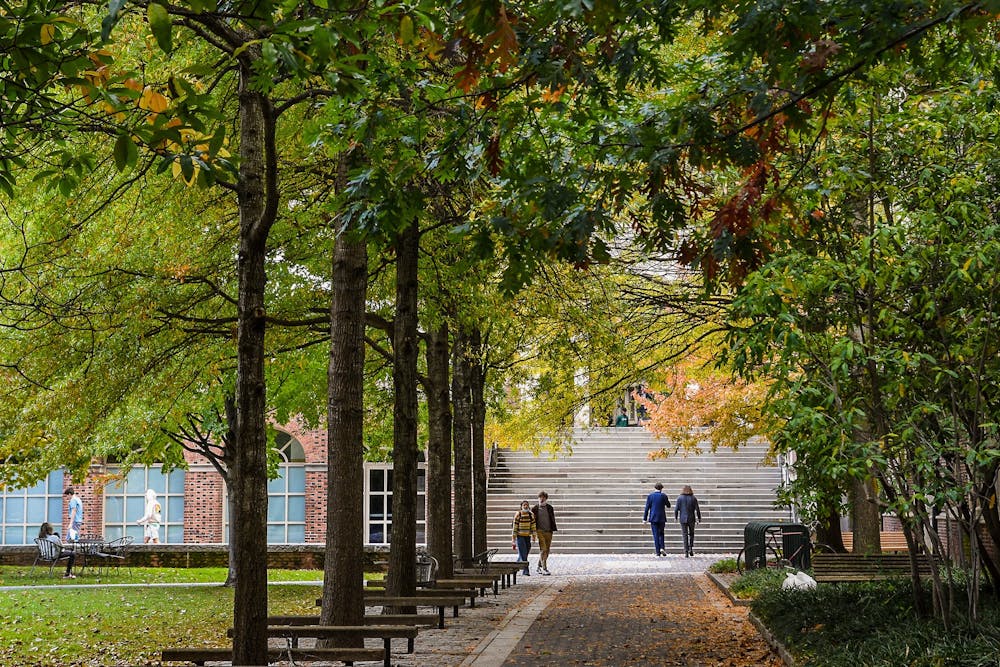The Student Sustainability Association at Penn has reoriented its goals to focus on expanding climate education opportunities rather than push for Penn's complete divestment from fossil fuels.
On Nov. 9, 2021, the University announced that it would halt new commitments to private equity vehicles dedicated to investments in fossil fuel production. Penn also introduced a $60 million commitment to hiring faculty in hiring faculty in Energy and the Environment. Following Penn’s November announcement, SSAP pivoted its focus from a divestment campaign to developing a stronger climate curriculum.
Former SSAP Co-Chair and College senior Vyshnavi Kosigishroff said that at the time of the announcement, SSAP described the November announcement as a “partial divestment” because it represented Penn’s furthest commitment to divest in the University’s history.
Kosigishroff said it was difficult for SSAP to let go of divestment as their primary cause. However, she said that after talking with professors, professionals, and alumni who previously worked on pushing the University to divest, “it became clear that this is the closest we will get to full divestment and, by many definitions, [this] is full divestment.”

According to SSAP’s Instagram, the group hopes that by shifting the focus of their work, they will be able to bring more students into the fight against climate change.
“We acknowledge that Penn hasn’t fully divested from fossil fuels yet," the group’s Feb. 24 post reads. "However, after [two] years of our leadership and constant agitation (and many years of student pressure prior), we think the most strategic and effective way of using our energy and maximizing our impact is shifting to our new campaign and setting up systems that can bring more students into the climate fight."
SSAP is now working to implement an emphasis on climate within Penn’s undergraduate curriculum. According to Kosigishroff, SSAP plans to spend the remainder of this semester re-categorizing climate-related courses under the current Physical World and Living World sectors.
Secretary for SSAP Amanda Sweeney said the group felt that, rather than adding an additional sector, adding a sustainability and climate focus to existing sectors would be a better solution given the number of sector requirements students are already required to take.
“Younger people are more vocal about the fact that they want actual climate classes — not even just environmental classes, but climate classes,” Kosigishroff said.
Kosigishroff added that SSAP’s constituent group, Penn Climate Ventures, is designing its own class offering about the ongoing climate crisis.
Sweeney said that in the future, SSAP may consider implementing more class offerings or finding new ways to implement climate education in a more interdisciplinary manner.
Penn will also now provide new opportunities in energy studies to graduate students. Mark Hughes, the founding faculty director of the Kleinman Center for Energy Policy, said that earlier this year, Penn’s Office of the Provost approved the creation of a Kleinman Center graduate group in energy policy, which will give students an opportunity to pursue doctoral education in energy.
Hughes added that the Kleinman Center will host Energy Week, scheduled to run from April 4 to 8. Hughes said the event is designed to highlight how energy science connects with energy policy, and showcase the depth of energy research conducted at the University and beyond.
Energy Week events will target topics like the science, policy, and finance behind energy.
One panel will examine how Indigenous communities "perceive the growth of renewable energy." Historically, Indigenous communities have been harmed by fossil fuel extraction — a phenomenon which the renewable energy transition may be able to reduce, the event description reads.
The week will also feature "student lightning talks" on April 5 which will showcase energy-focused student research conducted at Penn.
“That’s really everyone’s favorite part — when you really see the students presenting this amazing work, from all across campus,” Hughes said.









